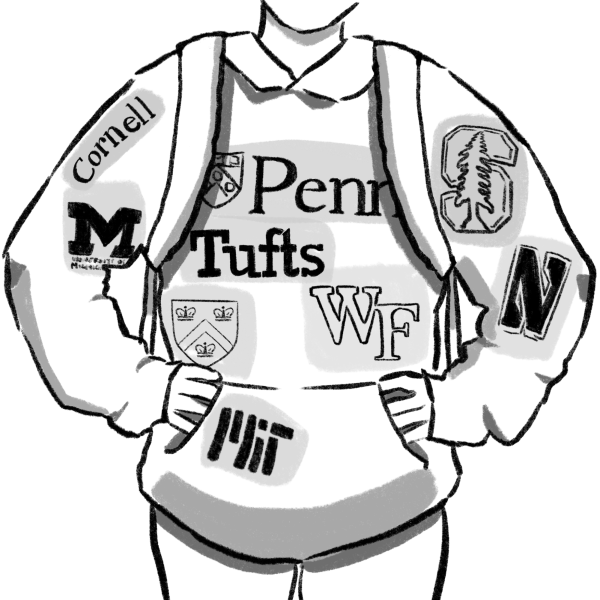When walking around the hallways of LM, it is nearly guaranteed that you will spot a large number of students wearing Ivy League-branded sweatshirts and T-shirts. Schools that, on top of having an average acceptance rate of three to seven percent, cost almost $90,000 per year. Ask any of the students wearing these schools on their shirts, “Why are you wearing that university on your shirt?” The answer will likely be one of: “One of my parents went there,” or “I got this shirt when I toured the school.”
As kids, our parents might have fed us the delusion to “dream big” or “shoot for the stars,” but the college admissions process brings LM back to reality. The majority of people are not going to be accepted into Ivy League schools. At LM, there were 308 applications to Ivy League schools in 2023. Out of 308 applications, only 23 (7.46 percent), were accepted. If schools like the Ivy’s are extremely difficult to be accepted into, then why do LM students continue to apply? LM students are given a warped perspective of their ability and heightened entitlement in the college admissions process due to socioeconomic and legacy status.

In a competitive academic environment like LM, students apply to prestigious schools for a variety of reasons—one of which is their socioeconomic status. Situated inside Montgomery County, the third wealthiest county in Pennsylvania, is Lower Merion Township, where the majority of LM students live. The LMSD website describes the township as “Montgomery County’s most affluent and populated municipality with the highest incomes, largest labor force, highest ratio of white collar and professional workers…” The median household income in 2021 was $148,721, over 90 percent more than the national average. This high degree of wealth allows many students to access opportunities that many people generally do not have, such as access to tutors to teach specific subjects of struggle, ACT/SAT tutors, expensive technology, competitive sports teams, volunteer opportunities, attendance to elite collegiate summer programs, and much more. However, having everything at your fingertips gives way to an increased sense of entitlement. Additionally, admission to a prestigious school is associated with a higher social status. Parents flex their children’s prestigious school acceptance as if they won the lottery – they may be right, as the college admission process can easily be seen as a coin toss.
Having a parent as an alumni of a top university or college is not unusual in our school district. Legacy status carries many advantages in admissions for selective schools. For example, Harvard had an overall acceptance rate of 3.2 percent in 2022. However, for legacy admissions, the acceptance rate was 32 percent. But does being a legacy guarantee admission to these elite schools? No. However, students at LM wear their parents’ attendance like a badge of honor and a birthright. Legacy status, while meaningful, does not guarantee admission to these highly-regarded schools.
Unfortunately, the sense of entitlement LM students have when applying to prestigious universities, a result of their social and legacy status, mostly leads to disappointment. An LM student has a higher chance of being left-handed than having their application accepted into an Ivy League school. As a result of their skewed perspective, they see a school’s low acceptance rate, and are left wondering why they didn’t make the cut. Perhaps they were shooting beyond the stars or dreaming far too big. The hard truth is that only 7.46 percent of applications from LM students end up being accepted into schools like the Ivy Leagues. It is not impossible to be accepted into those schools, but the chances are far too slim to believe acceptance is guaranteed. As a school community, we should work toward changing the mindsets of students from the time they are freshmen to show that the goal of college admissions is not to gain acceptance into the most selective college possible, but to enroll in a school where they feel they will thrive, be their happiest, and achieve their academic goals. Now, wouldn’t that be revolutionary?





